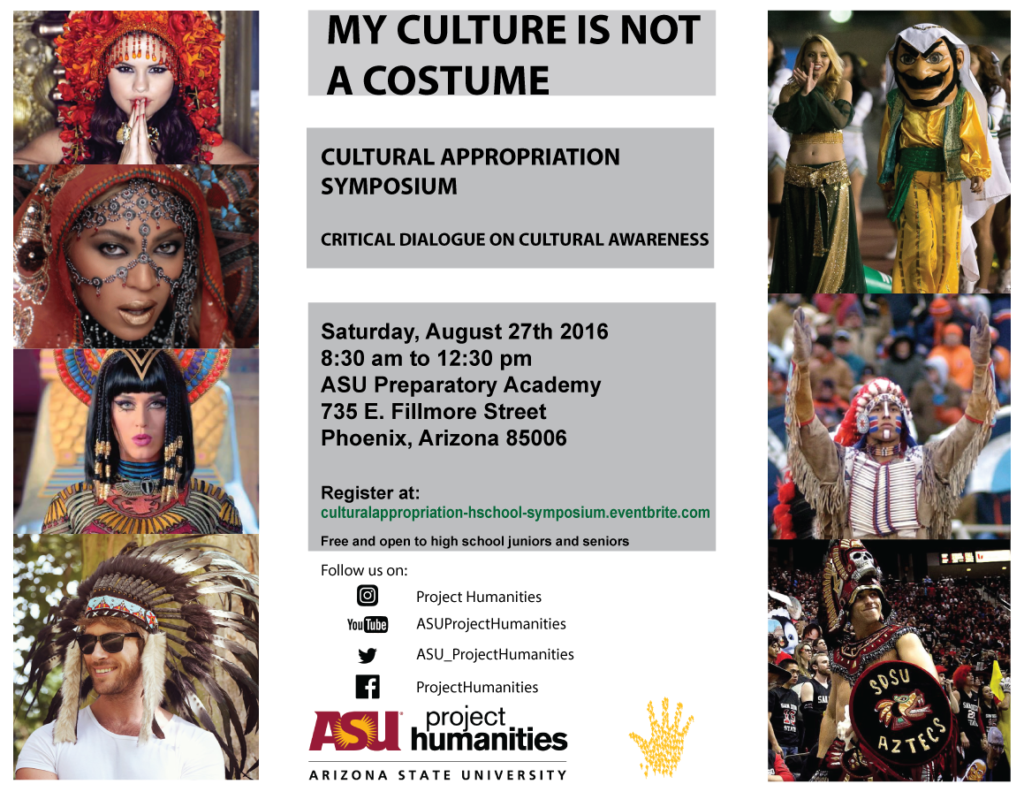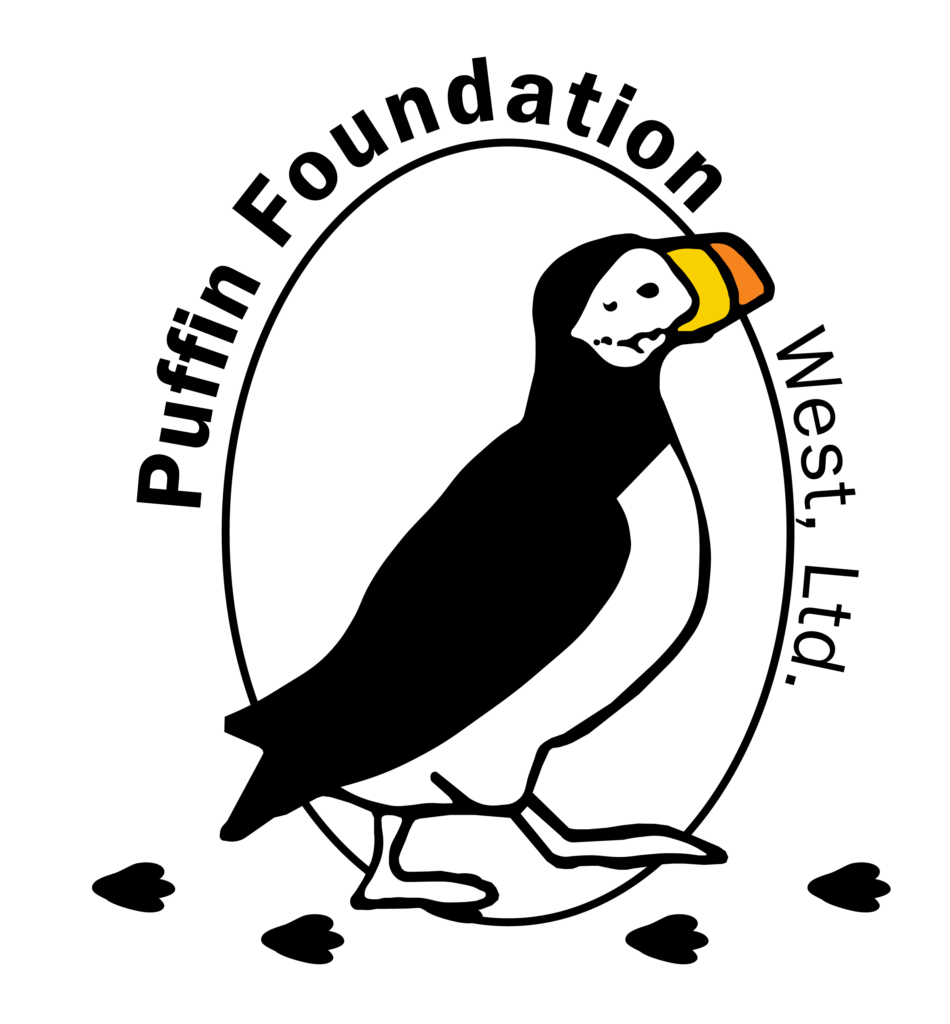From Our FREIND
Neal A. Lester, PhD, Founding Director of Project Humanities, Foundation Professor of English, Arizona State University
Please share this announcement with your respective colleagues and with your most engaged and curious high school juniors and seniors. This is a very necessary and timely critical conversation. From Iggy Azalea, Macklemore, and hip hop to Indigenous mascots, blackface, and hairstyles, we’ll cover the gamut of cultural appropriation, ultimately distinguishing between cultural appropriation and cultural appreciation.
Free all-day event with food, water, and snacks provided
“Cultural appropriation” describes the taking of creative or artistic forms, themes, or practices by one cultural group from another; generally Western appropriations of non‐Western or non‐white form. The act of cultural appropriation connotes cultural exploitation and dominance (Oxford). More broadly, cultural appropriation is the taking of intellectual property, cultural expressions, or artifacts, history and ways of knowledge from a culture that is not one’s own (Ziff). The goal of this symposium is to expand awareness of issues relevant to all communities by providing a space for scholarly and community dialogue. We will explore the various forms of cultural appropriation and cultural literacy and buffoonery while offering historical perspectives and explore the sociopolitical and cultural ramifications of these acts and behaviors. Conversations will be facilitated through the lens of race, gender, sexuality, class, age, ability, etc. to demonstrate the complexities and perils of cultural appropriation as it relates to personal and national identities. We will further demonstrate the value and necessity of cultivating positive communications, inclusive language, advocacy, self-awareness, and cultural competency.
Project Humanities Celebrates 10 Years of Hacking for Humanity
Creating business canvas models, three- and five-minute pitching, researching three competitors, determining financial sustainability, and building a website constitute the typical purview of business and engineering types but not necessarily humanities. Yet this is the arena Project Humanities at Arizona State University stepped into for the tenth time on Friday evening, October 6 through Sunday afternoon, October 8 in its unique and impactful “Hacks for Humanity: Hacking for the Social Good.” Bringing together undergraduates, high school students, professionals, retirees across the Valley for 36 hours to innovate a technology for the social good has been an effective way to demonstrate the rewards of diversity, collaboration, and community-building. In this space, engineers, businesspeople, artists, generalists, techies, and non-techies were randomly assigned teams to create and innovate. This year’s competition tracks were Disability/ Ableism, Fashion, and Animals (Non-Human), and 12 teams of 4-5 members worked diligently to create and pitch impressive products that embodied at least 3 of the 7 values Project Humanities calls Humanity 101—compassion, forgiveness, empathy, kindness, integrity, respect, and self-reflection. Humanity 101 is not a course but rather a series of activities and programs that center humanity and justice. 100+ individuals–team competitors, volunteers, mentors, Project Humanities staff, Project Humanities student workers and interns, workshop facilitators, keynote speaker, and judges–made this event particularly special as it was the first totally in-person Hacks for Humanity since before the pandemic.
In addition to the intense focus on social challenges and interventions, competitors enjoyed a fun collaborative icebreaker—building balloon furniture with a roll of masking tape and 25 balloons. In 20 minutes, teams built arm rests, mattresses, rafts, and chairs. Once built, a member of the team had to sit on the balloon for 30 seconds without popping said balloons. Other fun activities punctuating the event included therapy dogs, a game truck, board games, and lots of delicious food from Citron Caterer. An opening plenary by hackathon leading Sponsor—State Farm Companies Foundation—challenged everyone to be more mindful of everyday ableism experienced by those who are deaf or hard of hearing. Friday night’s plenary was followed by Saturday morning workshops on each of the three tracks.
Selected Event Feedback: Participant/ attendee feedback below was generated from our post-hackathon survey question: What did you find unique about the Hacking event?
“Amazing experience. ”
“Good execution and management.”
“It’s really nice that we are helping people through the knowledge we have.”
“Not just coders, teams are not required.”
“The humanity aspect.”
“Mix of tech & humanitarian.”
“I liked the mentors that provided lots of valuable experience and perspective.”
“The structure was amazing.”
“Being a Computer Science grad it never happens to look at things from a humanitarian perspective. That is something which I found really cool here.”
“The humanity focus and mix of participants made it more than just a tech conference.”
“Great connections and opportunities.”
“Amazing people.”
“Working on community development ideas.”
“The emphasis on stories.”
Participant/ attendee feedback below was generated from our post-hackathon survey question: What are some aspects of the Hackathon that you think we should keep in the future?
“Suspense factor.”
“Assignments according to interest in a team.”
“Food, innovation and technology!”
“Fun activities and dog therapy.”
“The organization and activities were good.”
“The extra workshops and activities were fun.”
“I like the in person concept, also the food was decent. I think it was well done.”
“Random teams, GREAT food, and raffle draws!”
“Food.”
“The structure and mentors from all aspects.”
“The food.”
“Better topics understanding.”
“Brainstorming.”
“The principles.”
“I liked the activities and workshops.”
“Keep it similar.”
“To participate everytime it happens”
“Giving out free stuff in the middle of the day to have some kind of excitement lol, thought that was neat.”
“Keeping it open to all.”
“There can be more time provided.”
“Let people decide their team formation.”
“Great food and clean places.”
“I really liked the access to good food, snacks, and mentors. The mixed teams were frightening at first, but ultimately provided a better experience.”
“I think the format of the hackathon itself is really very good and nothing more improvements are needed for now.”
“Instructions on websites.”
“The team spirit.”
“Humanities.”
“Everything was great.”
“I think that the hackathon should continue giving free food and making teams randomly and encourage people to stay in the event during the night.”
Event Location: 1951@SkySong, Arizona State University [Scottsdale, AZ]
Friday-Sunday (6-8 October 2023)
This year’s event competition consisted of 12 teams with 55 competing participants.
Participant Education
- Undergraduate students 30
- Graduate students 18
- High schoolers 2
- Business professionals 5
Participant Expertise
Graduate Student Majors
- Computer Science 5
- Information Technology 8
- Construction Management and Technology 1
- User Experience 2
- Cybersecurity 1
- Robotics and Autonomous Systems 1
Undergraduate Student Majors
- Computer Science 18
- Digital Marketing 1
- Digital Culture 1
- Business Communications 1
- Exploratory 1
- Biomedical Engineering 1
- Engineering (Robotics) 2
- Industrial Design 1
- Molecular Biosciences and Biotechnology 1
Competition Results
1st Place (Tied): Team 7 Diego’s Journey
Track: (Disability/Ableism)
Majors: Engineer (Robotics), Business Communications, Computer Science, Exploratory
Students: Undergraduate Students and Graduate Students
Diego’s Journey is an educational app with games designed to support and promote childhood development, with a tool for early detection of disabilities. This product addresses the challenge of learning disabilities, particularly in children. The software provides games for children throughout different developmental ranges (0-2 y/o, 2-5 y/o, and 5+ y/o). The solution is to provide a fun way for children to improve cognitive development through games, and providing performance metrics and notes to parents regarding their child’s performance. The Humanity 101 principles in this product are: compassion, empathy, and respect.
1st Place (Tied): Team 11 Sign Link
Track: (Disability/Ableism)
Majors: Computer Science, Molecular Biosciences and Biotechnology Psychology and Sustainability
Students: Undergraduate Students
A major challenge surrounds the ability for deaf and hearing communities to communicate with one another. Sign Link is a product that bridges gaps between those two communities by creating a translation tool that allows for seamless interactions between people who use sign language and people who speak. The Humanity 101 principles in this product are compassion, integrity, and kindness.
Second Place: Team 1 Pupability
Track: Animals (Non-Human)
Majors: Computer Science, Entrepreneurship
Students: Undergraduate Students and Graduate Student
Business Professionals: Developer, Entrepreneur
Pupability is an app that connects people with disabilities who don’t have a platform to find service animals that best meet their needs. This product allows potential owners and animal trainers to meet in a centralized marketplace with transparent pricing. The Humanity 101 principles in this product are compassion, empathy, respect, and integrity.
Third Place: Team 5 Generative Visual Language
Track: (Disability/Ableism)
Majors: Computer Science
Students: High School Students, Undergraduate Students, and Graduate Student
Generative Visual Language is a product that will revolutionize how people with difficulties hearing attend video calls. This video app transforms speech/text to context-relevant images for enhanced understanding, ensuring equal participation for everyone in video calls. The Humanity 101 principles in this product are compassion, integrity, and kindness.
Project Humanities Staff, & Student Interns (10)
Mentors (14)
Mentors committed a minimum of 2-hour blocks wherein they tested teams’ ideas and offered guidance. Mentors utilized their expertise to help teams spark creativity, generate ideas, problem solve, and develop final presentations. Mentors were scheduled according to their expertise and assisted participants with submitting on time quality work for deadlines. Team participants were required to show both their Canvas Business Model and Challenge Statement to two mentors and run their pitch by a panel of mentors for feedback and approval before presenting their live pitches to final competition judges. Mentors from diverse fields provided critical perspectives for each team.
For the tenth year in a row, Hacks for Humanity counted among its mentor teams State Farm Companies Foundation employees. State Farm employees provided feedback to teams’ live pitches prior to the final judging, giving teams the opportunity to fine tune their pitches.
Volunteers (8)
Volunteers had responsibilities such as event setup, assisting with the icebreaker, verifying team submissions for participants, as well as assisting Project Humanities staff as needed.
Eventbrite page: https://www.eventbrite.com/e/cultural-appropriation-high-school-symposium-tickets-26429986802




